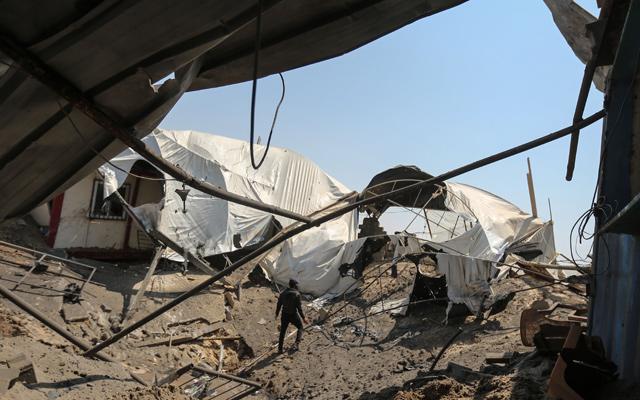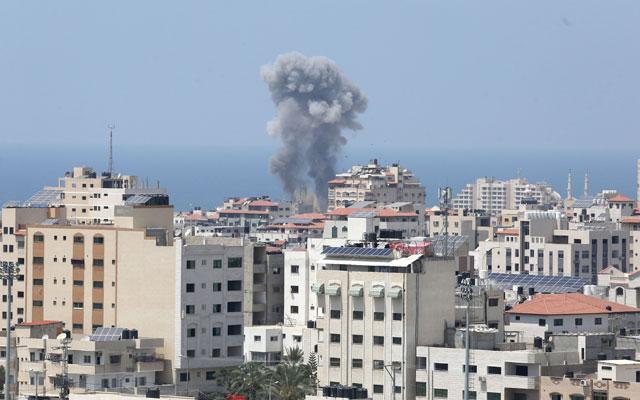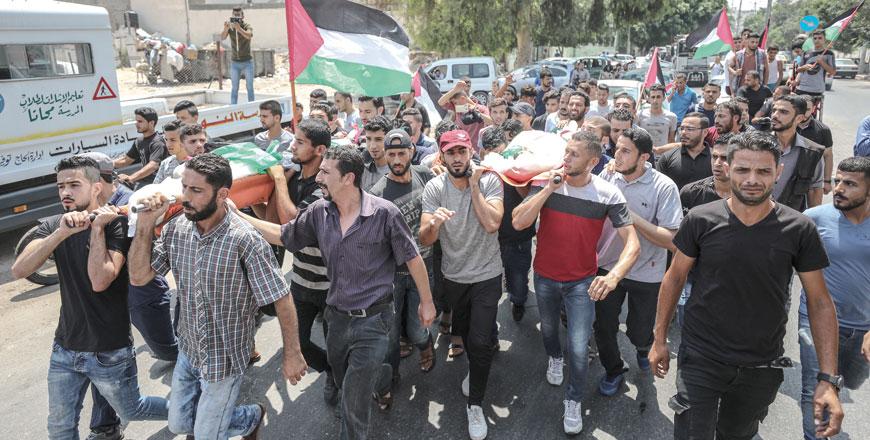You are here
Israeli occupation forces hit more Hamas sites, deny ceasefire claims
By AFP - May 31,2018 - Last updated at May 31,2018

A man inspects the damage at a site targeted by an Israeli air strike a day before in Khan Younis in the southern Gaza strip on Wednesday (AFP photo)
UNITED NATIONS/GAZA CITY — Israel said it struck 25 more Hamas sites overnight after a barrage of rocket and mortar fire from the Gaza Strip, denying Palestinian claims of a ceasefire on Wednesday after the worst flare-up since the 2014 Israeli war on Gaza.
The exchange of fire raised the possibility of yet another war in the beleaguered Palestinian enclave run by Islamist resistance movement Hamas, which would be the fourth since 2008.
Israel has targeted more than 60 military targets in the Gaza Strip over 24 hours, saying some 70 rockets and mortars were fired into its territory throughout the day on Tuesday, a number of which were intercepted by air defence systems.
Three Israeli occupation force soldiers were wounded, one moderately and two lightly, the military said. There were no immediate reports of casualties in Gaza.
But after Tuesday’s flareup, followed by sirens and explosions into the night, there were Palestinian claims of a ceasefire.
Late on Tuesday, an Islamic Jihad spokesman said a ceasefire agreement had been reached, and on Wednesday senior Hamas official Khalil Al Hayya also spoke of an accord.
There was relative calm in the Gaza Strip on Wednesday morning.
Tuesday’s violence followed weeks of protests along the border between Israel and the blockaded Palestinian enclave.
In a rare joint statement, Hamas and Islamic Jihad declared shared responsibility for the rocket and mortar fire, saying it was in retaliation for Israeli attacks targeting their positions.
Three Islamic Jihad members were killed in an Israeli strike on Sunday.
High alert
Early on Tuesday, some 28 mortar shells were fired towards Israel from the Gaza Strip.
Israel said most were intercepted by its air defence systems but put residents in the area on high alert, ordering them to stay within 15 seconds of shelters.
It was the largest barrage fired from Gaza into Israel, and Israel’s biggest response, since a 2014 war.
Kuwait on Wednesday blocked a US-drafted UN Security Council statement that would have strongly condemned Palestinian rocket firings from the Gaza Strip on Israel.
The United States had circulated the draft text ahead of an emergency council meeting on the rocket and mortar attacks by Hamas and Islamic Jihad.
Kuwait, a non-permanent council member that represents Arab countries, said that it was blocking the statement to allow for consideration of a draft resolution it has put forward on the protection of Palestinian civilians.
Two other draft statements expressing concern about the violence in Gaza were previously blocked by the United States, laying bare the sharp divisions on the Security Council over the Israeli-Palestinian conflict.
Security Council statements are adopted by consensus by all 15 members.
Explosions shake enclave
Prime Minister Benjamin Netanyahu had vowed Tuesday to “respond to these attacks powerfully”.
Shortly after he spoke, Israeli occupation forces began air strikes in Gaza. Explosions shook the Palestinian enclave and smoke rose from the sites hit.
Later in the day, further rockets or mortar rounds from Gaza were intercepted, the Israel said. It claimed some of the mortars fired were supplied by Iran.
Islamic Jihad is the second-largest armed group in Gaza after Hamas.
Hamas said in a statement on Tuesday that “what the resistance carried out this morning comes within the framework of the natural right to defend our people”.
“The Israeli occupation bears full responsibility for any upcoming escalation,” it said.
Separately on Tuesday morning, Palestinians launched boats from Gaza to protest Israel’s blockade, in a peaceful demonstration.
Israeli forces later stopped and seized the main protest boat as it approached the blockade limit at nine nautical miles, while others were said to have turned back.
Weeks of protests
Tuesday’s incidents followed weeks of demonstrations along the Gaza-Israel border fence, beginning on March 30.
The protests demanded that Palestinians who fled or were expelled in the 1948 war surrounding Israel’s creation be allowed to return to their homeland.
They peaked on May 14, when at least 61 Palestinians were killed by Israeli occupation forces as tens of thousands of Gazans protested the controversial US transfer of its embassy in Israel from Tel Aviv to occupied Jerusalem the same day.
At least 121 Palestinians have been killed by Israeli occupation forces’ fire in the unrest. No Israelis have been killed.
Israel has faced international criticism and calls for an independent investigation over its use of live fire during the protests.
The Gaza Strip has been under Israeli blockade for over a decade, bring the coastal enclave to the brink of economic collapse.
Related Articles
GAZA-ISRAEL BORDER/GAZA CITY — Forces from Palestinian resistance organisations launched on Tuesday their heaviest barrages against Israel s
GAZA CITY, Palestinian Territories — A ceasefire announced by Hamas largely held Sunday after the most severe exchange of fire between Israe
GAZA CITY, Palestinian Territories — Israeli occupation warplanes pounded Hamas targets in the Gaza Strip early on Wednesday in a new flare-


















